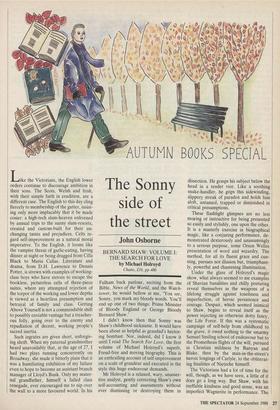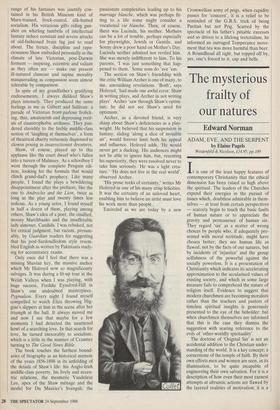BOOKS SPECIAL The Sonny side of the street
John Osborne
BERNARD SHAW: VOLUME I: THE SEARCH FOR LOVE by Michael Holroyd Chatto, £16, pp.486 Like the Victorians, the English lower orders continue to discourage ambition in their sons. The Scots, Welsh and Irish, with their simple faith in erudition, are a different case. The English to this day cling fiercely to membership of the gutter, insist- ing only more implacably that it be made cosier: a high-tech slum-heaven enlivened by annual trips to the sunny slum-resorts, created and custom-built for their un- changing tastes and prejudices. Celts re- gard self-improvement as a natural moral imperative. To the English, it looms like the vampire threat of garlic-eating, having dinner at night or being dragged from Cilla Black to Maria Callas. Literature and drama, from D.H. Lawrence to Dennis Potter, is strewn with examples of working- class boys who have striven to escape the bookless, pictureless cells of three-piece suites, where any attempted rejection of the torpor of the working and lower depths is viewed as a heartless presumption and betrayal of family and class. Getting Above Yourself is not a commendable shift to possibly enviable vantage but a treacher- ous folly, going over to the enemy and repudiation of decent, working people's sacred inertia.
Such ingrates are given short, unforgiv- ing shrift. When my paternal grandmother heard unavoidably that, at the age of 27, I had two plays running concurrently on Broadway, she made it bitterly plain that it was a humiliating exhibition of my failure even to hope to become an assistant branch manager of Lloyd's Bank. Only my mater- nal grandfather, himself a failed class renegade, ever encouraged me to nip over the wall to a more favoured world. In his Fulham back parlour, reciting from the Bible, News of the World, and the Watch- tower, he would bellow at me, 'You see, Sonny, you mark my bloody words. You'll end up one of two things: Prime Minister of Bloody England or George Bloody Bernard Shaw.'
I didn't know then that Sonny was Shaw's childhood nickname. It would have been about as helpful as grandad's hector- ing bombast. Nor, indeed, did I know it until I read The Search For Love, the first volume of Michael Holroyd's superb, Freud-free and moving biography. This is an enthralling account of self-improvement on a scale of grandeur and executed in the style this huge endeavour demands.
Mr Holroyd is a relaxed, wary, unasser- tive analyst, gently correcting Shaw's own self-accounting and assessments without ever dismissing or destroying them in dissection. He grasps his subject below the head in a tender vice. Like a soothing snake-handler, he grips this sidewinding, slippery streak of paradox and holds him aloft, untamed, trapped or diminished in critical presumptions.
These flashlight glimpses are no less moving or instructive for being presented so easily and stylishly, one upon the other. It is a masterly exercise in biographical magic, like a conjuring performance, de- monstrated dexterously and unassumingly to a serious purpose, some Orson Welles presentation of word and wizardry. The method, for all its fluent grace and cun- ning, pursues not illusion but, triumphant- ly, powerful and chastening illumination.
Under the glare of Holroyd's magic show, what always seemed to me examples of Shavian banalities and chilly posturing reveal themselves as the weapons of a lifelong struggle against loneliness and imperfection, of heroic persistence and courage. Despair, which seemed inimical to Shaw, begins to reveal itself as the power injecting an otherwise dotty fancy, the Life Force. If this was a systematic campaign of self-help from childhood to the grave, it owed nothing to the smarmy Samuel Smiling school of endeavour but to the Promethean flights of the will, pursued in Christian mildness by Bunyan and Blake, then by the man-in-the-street's heroic longings of Carlyle, to the obliterat- ing finalities of Nietzche himself.
The Victorians had a lot of time for the will, though, as we have seen, a little of it does go a long way. But Shaw, with his ineffable kindness and good sense, was an imperfect Wagnerite in performance. The range of his fantasies was jauntily con- tained in his British Museum kind of Marx-trained, frock-coated, silk-hatted socialism. His voracious gifts riding gun- shot on whirling tumbrils of intellectual fantasy induce constant and severe attacks of old-fashioned brain fag just to read about. The frenzy, discipline and rapa- ciousness Shaw embodied personally in the climate of late Victorian, post-Darwin ferment — inspiring, eccentric and valiant as they often are — make our present ill-natured clamour and supine morality masquerading as compassion seem almost tolerable by comparison.
In spite of my grandfather's gratifying endorsements, I always disliked Shaw's plays intensely. They produced the same feelings in me as Gilbert and Sullivan: a parade of Victorian front-parlour frolick- ing, thin, amateurish and depressing recit- als of claustrophobic archness. They pan- dered slavishly to the feeble middle-class notion of 'laughing at themselves', a form of theatrical charity virtuously dispensed to clowns posing as insurrectionist dreamers.
Shaw, of course, played up to this applause like the court dwarf who's fallen into a tureen of Malmsey. As a schoolboy I went through the complete Penguin edi- tion, looking for the formula that would clinch grand-dad's prophecy. Like many people, I found the plays a bewildering disappointment after the prefaces, like the one to Androcles and the Lion, twice as long as the play and twenty times less. tedious. As a young actor, I found myself in half a dozen of them, playing among others, Shaw's idea of a poet, the cissified, moony Marchbanks and the insufferable lady almoner, Candida. I was rebuked, not for critical judgment, but racism, presum- ably, by Guardian readers for suggesting that his post-Sardoudledom style resem- bled English as written by Pakistanis study- ing for accountancy exams.
Only once did I feel that there was a missing Shavian key, the massive anchor which Mr Holroyd now so magnificently salvages. It was during a fit-up tour in the Welsh Valleys when I was playing, with huge success, Freddie Eynsford-Hill in Shaw's one undoubted masterpiece, Pygmalion. Every night I found myself compelled to watch Eliza throwing Hig- gins's slippers at him in the scene after her triumph at the ball. It always moved me and now I see that maybe for a few moments I had detected the unuttered howl of a searching love. In that search for love, he turned inexorably to socialism, which is a little in the manner of Cranmer turning to The Good News Bible.
The book touches the furthest bound- aries of biography as an historical memoir of the years 1856-1898 in its unfolding of the details of Shaw's life: his Anglo-Irish middle-class poverty, his lively and eccen- tric relations, the mesmeric Vandeleur Lee, apex of the Shaw ménage and the model for Du Maurier's Svengali; the passionate complexities leading up to his marriage blanche, which was perhaps fit- ting to a life some might consider a vocational vie blanche. Then, of course, there was Lucinda, his mother. Mothers can be a lot of trouble, perhaps especially for playwrights, Jewish or Gentile, and Sonny drew a poor hand on Mother's Day. Lucinda neither admired nor reviled him. She was merely indifferent to him. To his parents, 'I was just something that hap- pened to them.' Some sons do 'ave 'em.
The section on Shaw's friendship with the critic William Archer is one of many, to me, astonishing revelations. 'Both', says Holroyd, 'had made one awful error. Shaw in writing plays, and Archer in not writing plays'. Archer 'saw through Shaw's optim- ism; he did not see Shaw's need for optimism.'
Archer, as a devoted friend, is very sharp about Shaw's deficiencies as a play- wright. He believed that his suspension in fantasy, sliding 'along a slice of invisible air', would forever limit both his appeal and influence. Holroyd adds, 'He would never get a ducking. His audiences might not be able to ignore him, but, resenting his superiority, they were resolved never to take him seriously. He was a light crea- ture.' He does not live in the real world', observed Archer.
'His prose reeks of certainty,' writes Mr Holroyd in one of his many crisp felicities. It was the certainty of an unloved heart, enabling him to believe an artist must love his work more than people.
Encircled as we are today by a new Cromwellian army of prigs, when cupidity passes for 'concern', it is a relief to be reminded of the G.B.S. trick of being Puritan but not Prig. Scarred by the spectacle of his father's pitiable excesses and so driven to a lifelong teetotalism, he informed an outraged Temperance move- ment that tea was more harmful than beer. A Roundhead all right, but topped off by, yes, one's forced to it, cap and bells.































































 Previous page
Previous page